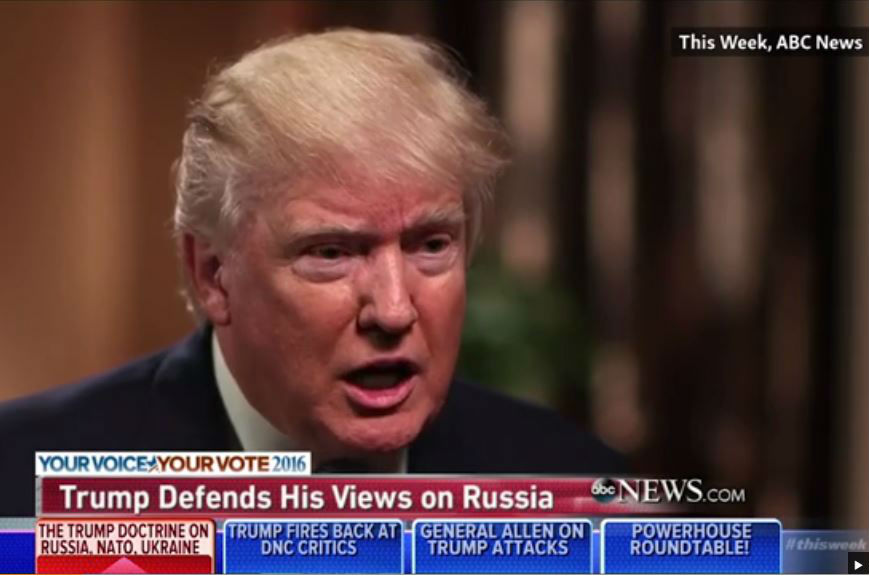 Hillary Clinton’s campaign bus rattles over potholes and bumps in the US Rust Belt while Donald Trump flits around on his private jet.
Hillary Clinton’s campaign bus rattles over potholes and bumps in the US Rust Belt while Donald Trump flits around on his private jet.
Such optics never seem to hurt Trump or, conversely, to help Hillary, but much depends on voters in the Rust Belt, notably in Ohio and Pennsylvania.
Trump may be a master of branding but his cobranding with Russian President Vladimir Putin will damage him where he needs the most support. A voter living in Ohio or Pennsylvania doesn’t have to be Ukrainian to understand that Putin and his nuclear arsenal is more dangerous to the United States than ISIS. And a significant percentage of Americans in the Rust Belt are from countries, like Ukraine, that have been victimized by Russia for generations.
For example, persons of Polish descent in the Rust Belt represent significant swing votes: In Pennsylvania 7.2 percent of the total population is Polish; Ohio 3.8 percent; New York 5.2 percent; Illinois 7.5 percent; Michigan 8.6 percent, and Wisconsin 9.3 percent. These people all have spouses, children, and friends they influence, and are attuned to the rising anxiety levels in their familial homeland of Poland particularly since Putin invaded Georgia and Ukraine.
Then there are the Ukrainians. There are 976,314 persons of Ukrainian heritage in the United States, according to the 2006 census, a total of 122,291 in Pennsylvania and 48,908 in Ohio.
Hungarians have also been victims and 1.5 million live in the United States, according to the 2010 census, with 1.7 percent in Ohio and 1.2 percent in Pennsylvania.
Another 409,000 Americans are Russian-born who may have ethnic Russian descent or be from ethnic groups that were part of the Soviet empire such as people with Armenian, Azerbaijani, Belorussian, Estonian, Georgian, Jewish, Kazakh, Kyrgyz, Latvian, Lithuanian, Rusyn, Ukrainian, or Uzbek backgrounds. The largest numbers have settled in New York and Pennsylvania.
Add to that Americans with ethnic backgrounds from other former satellites of the Soviet Union such as Albania, Bulgaria, Croatia, the Czech Republic, East Germany, Hungary, Romania, Slovakia, and the former Yugoslavia. It’s interesting to note that the Republican Governor of Ohio, John Kasich, who fiercely opposes Trump’s candidacy, is of Croatian and Czech lineage.
Kasich boycotted the Trump convention in his own home state and months ago tweeted out that Trump would pick Putin as his running mate so they could “Make Tyranny Great Again.”
These communities from Eastern and Central Europe vote.
“These communities pride themselves in their interaction with their elected representatives advocating issues of concerns” and “active participation in US elections,” said Michael Sawkiw, Jr., director of the Ukrainian National Information Service in a July 20 interview. “Many share an acute apprehension of resurgent Russian aggression,” he said.
Frankly, Trump has made a mistake by fanning the Cold War flames. To these Americans in the Rust Belt and their relatives everywhere, Trump’s coziness, admiration, and inner circle of advisers linked to Putin are unacceptable. It is also contrary to his promise to keep America safe.
On Sunday, he made it worse. “[Putin’s] not going into Ukraine, OK, just so you understand. He’s not going to go into Ukraine, all right? You can mark it down. You can put it down. You can take it anywhere you want,” Trump said in a July 31 interview with ABC’s George Stephanopoulos on “This Week.” He also said that he’d consider recognizing Russian control of Crimea if he’s elected.
The point of all this is that a naïve, ill-informed businessman running for president of the free world doesn’t have a clue. He has no sense of history, outrageous to those who comprehend that just two years ago Ukrainians fought and died on their streets to rid their country of the Putin puppet that Trump’s campaign manager Paul Manafort made millions to advise.
Trump’s bias toward Russia’s strongman will continue to send anxious tremors through America’s victimized ethnic communities as well as Cold Warriors in the Republican ranks, the military, and veterans. When Trump suggested last week that the Russians should engage in more cyberattacks, Republican House Leader Paul Ryan’s spokesman stated bluntly that “Russia is a global menace led by a devious thug,” and he’s right.
Diane Francis is a Senior Fellow at the Atlantic Council’s Dinu Patriciu Eurasia Center, Editor at Large with the National Post in Canada, a Distinguished Professor at Ryerson University’s Ted Rogers School of Management, and author of ten books.
Image: Republican Presidential Candidate Donald J. Trump explains his views on Russia to ABC's George Stephanopoulos on “This Week” on July 31. Photo credit: ABC News
